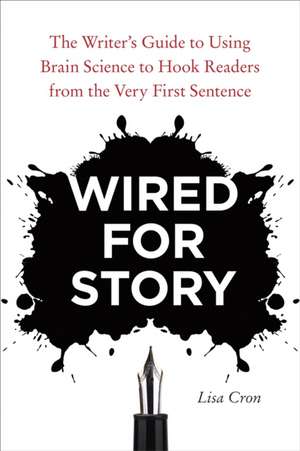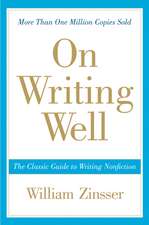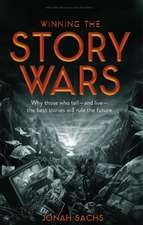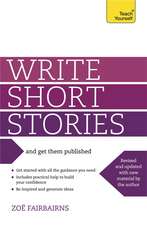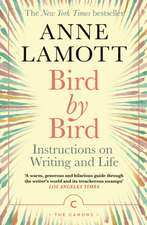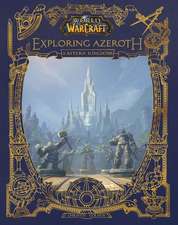Wired for Story
Autor Lisa Cronen Limba Engleză Paperback – 30 iul 2012
Imagine knowing what the brain craves from every tale it encounters, what fuels the success of any great story, and what keeps readers transfixed. Wired for Story reveals these cognitive secrets—and it’s a game-changer for anyone who has ever set pen to paper.
The vast majority of writing advice focuses on “writing well” as if it were the same as telling a great story. This is exactly where many aspiring writers fail—they strive for beautiful metaphors, authentic dialogue, and interesting characters, losing sight of the one thing that every engaging story must do: ignite the brain’s hardwired desire to learn what happens next. When writers tap into the evolutionary purpose of story and electrify our curiosity, it triggers a delicious dopamine rush that tells us to pay attention. Without it, even the most perfect prose won’t hold anyone’s interest.
Backed by recent breakthroughs in neuroscience as well as examples from novels, screenplays, and short stories, Wired for Story offers a revolutionary look at story as the brain experiences it. Each chapter zeroes in on an aspect of the brain, its corresponding revelation about story, and the way to apply it to your storytelling right now.
Preț: 73.91 lei
Preț vechi: 88.50 lei
-16% Nou
Puncte Express: 111
Preț estimativ în valută:
14.14€ • 14.77$ • 11.70£
14.14€ • 14.77$ • 11.70£
Carte disponibilă
Livrare economică 14-21 martie
Livrare express 27 februarie-05 martie pentru 35.79 lei
Preluare comenzi: 021 569.72.76
Specificații
ISBN-13: 9781607742456
ISBN-10: 1607742454
Pagini: 262
Ilustrații: ONE COLOR
Dimensiuni: 141 x 210 x 20 mm
Greutate: 0.27 kg
Editura: Ten Speed Press
ISBN-10: 1607742454
Pagini: 262
Ilustrații: ONE COLOR
Dimensiuni: 141 x 210 x 20 mm
Greutate: 0.27 kg
Editura: Ten Speed Press
Notă biografică
LISA CRON spent a decade in publishing—first at W.W. Norton then at John Muir Publications—before turning to television, where she’s been supervising producer on shows for Showtime and Court TV. She’s been a story consultant for Warner Brothers, the William Morris Agency, Village Roadshow, and Icon; an agent at the Angela Rinaldi Literary Agency; and is featured in Ask the Pros: Screenwriting. Lisa is an instructor in the UCLA Extension Writers’ Program.
Extras
I find that most people know what a story is until they sit down to write one.
—Flannery O’Connor
In the second it takes you to read this sentence, your senses are showering you with over 11,000,000 pieces of information. Your conscious mind is capable of registering about forty of them. And when it comes to actually paying attention? On a good day, you can process seven bits of data at a time. On a bad day, five.(1) On one of those days? More like minus three.
And yet, you’re not only making your way in a complex world just fine, you’re preparing to write a story about someone navigating a world of your creation. So how important can any of those other 10,999,960 bits of information really be?
Very, as it turns out—which is why, although we don’t register them consciously, our brain is busy noting, analyzing, and deciding whether they’re something irrelevant (like the fact that the sky is still blue) or something we need to pay attention to (like the sound of a horn blaring as we meander across the street, lost in thought about the hunky guy who just moved in next door).
What’s your brain’s criterion for either leaving you in peace to daydream or demanding your immediate and total attention? It’s simple. Your brain, along with every other living organism down to the humble amoeba, has one main goal: survival. Your subconscious brain—which neuroscientists refer to as the adaptive or cognitive unconscious—is a finely tuned instrument, instantly aware of what matters, what doesn’t, why, and, hopefully, what you should do about it.(2) It knows you don’t have the time to think, “Gee, what’s that loud noise? Oh, it’s a horn honking; it must be coming from that great big SUV that’s barreling straight at me. The driver was probably texting and didn’t notice me until it was too late to stop. Maybe I should get out of the—”
Splat.
And so, to keep us from ending up as road kill, our brain devised a method of sifting through and interpreting all that information much, much faster than our slowpoke conscious mind is capable of. Although for most other animals that sort of innate reflex is where evolution called it a day, thus relegating their reactions to what neuroscientists aptly refer to as zombie systems, we humans got a little something extra.(3) Our brain developed a way to consciously navigate information so that, provided we have the time, we can decide on our own what to do next.
Story.
Here’s how neuroscientist Antonio Damasio sums it up: “The problem of how to make all this wisdom understandable, transmissible, persuasive, enforceable—in a word, of how to make it stick—was faced and a solution found. Storytelling was the solution—storytelling is something brains do, naturally and implicitly. . . . [I]t should be no surprise that it pervades the entire fabric of human societies and cultures.”(4)
We think in story. It’s hardwired in our brain. It’s how we make strategic sense of the otherwise overwhelming world around us. Simply put, the brain constantly seeks meaning from all the input thrown at it, yanks out what’s important for our survival on a need-to-know basis, and tells us a story about it, based on what it knows of our past experience with it, how we feel about it, and how it might affect us. Rather than recording everything on a first come, first served basis, our brain casts us as “the protagonist” and then edits our experience with cinema-like precision, creating logical interrelations, mapping connections between memories, ideas, and events for future reference.(5)
Story is the language of experience, whether it’s ours, someone else’s, or that of fictional characters. Other people’s stories are as important as the stories we tell ourselves. Because if all we ever had to go on was our own experience, we wouldn’t make it out of onesies.
Now for the really important question—what does all this mean for us writers? It means that we can now decode what the brain (aka the reader) is really looking for in every story, beginning with the two key concepts that underlie all the cognitive secrets in this book:
1. Neuroscientists believe the reason our already overloaded brain devotes so much precious time and space to allowing us to get lost in a story is that without stories, we’d be toast. Stories allow us to simulate intense experiences without actually having to live through them. This was a matter of life and death back in the Stone Age, when if you waited for experience to teach you that the rustling in the bushes was actually a lion looking for lunch, you’d end up the main course. It’s even more crucial now, because once we mastered the physical world, our brain evolved to tackle something far trickier: the social realm. Story evolved as a way to explore our own mind and the minds of others, as a sort of dress rehearsal for the future.(6) As a result, story helps us survive not only in the life-and-death physical sense but also in a life-well-lived social sense. Renowned cognitive scientist and Harvard professor Steven Pinker explains our need for story this way:
Fictional narratives supply us with a mental catalogue of the fatal conundrums we might face someday and the outcomes of strategies we could deploy in them. What are the options if I were to suspect that my uncle killed my father, took his position, and married my mother? If my hapless older brother got no respect in the family, are there circumstances that might lead him to betray me? What’s the worst that could happen if I were seduced by a client while my wife and daughter were away for the weekend? What’s the worst that could happen if I had an affair to spice up my boring life as the wife of a country doctor? How can I avoid a suicidal confrontation with raiders who want my land today without looking like a coward and thereby ceding it to them tomorrow? The answers are to be found in any bookstore or any video store. The cliché that life imitates art is true because the function of some kinds of art is for life to imitate it.(7)
2. Not only do we crave story, but we have very specific hardwired expectations for every story we read, even though—and here’s the kicker—chances are next to nil that the average reader could tell you what those expectations are. If pressed, she’d be far more likely to refer to the magic of story, that certain je ne sais quoi that can’t be quantified. And who could blame her? The real answer is rather counterintuitive: our expectations have everything to do with the story’s ability to provide information on how we might safely navigate this earthly plane. To that end, we run them through our own very sophisticated subconscious sense of what a story is supposed to do: plunk someone with a clear goal into an increasingly difficult situation they then have to navigate. When a story meets our brain’s criteria, we relax and slip into the protagonist’s skin, eager to experience what his or her struggle feels like, without having to leave the comfort of home.
All this is incredibly useful for writers because it neatly defines what a story is—and what it’s not. In this chapter, that’s exactly what we’ll examine: the four elements that make up what a story is; what we, as readers, are wired to expect when we dive into the first page of a book and try it on for size; and why even the most lyrical, beautiful writing by itself is as inviting as a big bowl of wax fruit.
—Flannery O’Connor
In the second it takes you to read this sentence, your senses are showering you with over 11,000,000 pieces of information. Your conscious mind is capable of registering about forty of them. And when it comes to actually paying attention? On a good day, you can process seven bits of data at a time. On a bad day, five.(1) On one of those days? More like minus three.
And yet, you’re not only making your way in a complex world just fine, you’re preparing to write a story about someone navigating a world of your creation. So how important can any of those other 10,999,960 bits of information really be?
Very, as it turns out—which is why, although we don’t register them consciously, our brain is busy noting, analyzing, and deciding whether they’re something irrelevant (like the fact that the sky is still blue) or something we need to pay attention to (like the sound of a horn blaring as we meander across the street, lost in thought about the hunky guy who just moved in next door).
What’s your brain’s criterion for either leaving you in peace to daydream or demanding your immediate and total attention? It’s simple. Your brain, along with every other living organism down to the humble amoeba, has one main goal: survival. Your subconscious brain—which neuroscientists refer to as the adaptive or cognitive unconscious—is a finely tuned instrument, instantly aware of what matters, what doesn’t, why, and, hopefully, what you should do about it.(2) It knows you don’t have the time to think, “Gee, what’s that loud noise? Oh, it’s a horn honking; it must be coming from that great big SUV that’s barreling straight at me. The driver was probably texting and didn’t notice me until it was too late to stop. Maybe I should get out of the—”
Splat.
And so, to keep us from ending up as road kill, our brain devised a method of sifting through and interpreting all that information much, much faster than our slowpoke conscious mind is capable of. Although for most other animals that sort of innate reflex is where evolution called it a day, thus relegating their reactions to what neuroscientists aptly refer to as zombie systems, we humans got a little something extra.(3) Our brain developed a way to consciously navigate information so that, provided we have the time, we can decide on our own what to do next.
Story.
Here’s how neuroscientist Antonio Damasio sums it up: “The problem of how to make all this wisdom understandable, transmissible, persuasive, enforceable—in a word, of how to make it stick—was faced and a solution found. Storytelling was the solution—storytelling is something brains do, naturally and implicitly. . . . [I]t should be no surprise that it pervades the entire fabric of human societies and cultures.”(4)
We think in story. It’s hardwired in our brain. It’s how we make strategic sense of the otherwise overwhelming world around us. Simply put, the brain constantly seeks meaning from all the input thrown at it, yanks out what’s important for our survival on a need-to-know basis, and tells us a story about it, based on what it knows of our past experience with it, how we feel about it, and how it might affect us. Rather than recording everything on a first come, first served basis, our brain casts us as “the protagonist” and then edits our experience with cinema-like precision, creating logical interrelations, mapping connections between memories, ideas, and events for future reference.(5)
Story is the language of experience, whether it’s ours, someone else’s, or that of fictional characters. Other people’s stories are as important as the stories we tell ourselves. Because if all we ever had to go on was our own experience, we wouldn’t make it out of onesies.
Now for the really important question—what does all this mean for us writers? It means that we can now decode what the brain (aka the reader) is really looking for in every story, beginning with the two key concepts that underlie all the cognitive secrets in this book:
1. Neuroscientists believe the reason our already overloaded brain devotes so much precious time and space to allowing us to get lost in a story is that without stories, we’d be toast. Stories allow us to simulate intense experiences without actually having to live through them. This was a matter of life and death back in the Stone Age, when if you waited for experience to teach you that the rustling in the bushes was actually a lion looking for lunch, you’d end up the main course. It’s even more crucial now, because once we mastered the physical world, our brain evolved to tackle something far trickier: the social realm. Story evolved as a way to explore our own mind and the minds of others, as a sort of dress rehearsal for the future.(6) As a result, story helps us survive not only in the life-and-death physical sense but also in a life-well-lived social sense. Renowned cognitive scientist and Harvard professor Steven Pinker explains our need for story this way:
Fictional narratives supply us with a mental catalogue of the fatal conundrums we might face someday and the outcomes of strategies we could deploy in them. What are the options if I were to suspect that my uncle killed my father, took his position, and married my mother? If my hapless older brother got no respect in the family, are there circumstances that might lead him to betray me? What’s the worst that could happen if I were seduced by a client while my wife and daughter were away for the weekend? What’s the worst that could happen if I had an affair to spice up my boring life as the wife of a country doctor? How can I avoid a suicidal confrontation with raiders who want my land today without looking like a coward and thereby ceding it to them tomorrow? The answers are to be found in any bookstore or any video store. The cliché that life imitates art is true because the function of some kinds of art is for life to imitate it.(7)
2. Not only do we crave story, but we have very specific hardwired expectations for every story we read, even though—and here’s the kicker—chances are next to nil that the average reader could tell you what those expectations are. If pressed, she’d be far more likely to refer to the magic of story, that certain je ne sais quoi that can’t be quantified. And who could blame her? The real answer is rather counterintuitive: our expectations have everything to do with the story’s ability to provide information on how we might safely navigate this earthly plane. To that end, we run them through our own very sophisticated subconscious sense of what a story is supposed to do: plunk someone with a clear goal into an increasingly difficult situation they then have to navigate. When a story meets our brain’s criteria, we relax and slip into the protagonist’s skin, eager to experience what his or her struggle feels like, without having to leave the comfort of home.
All this is incredibly useful for writers because it neatly defines what a story is—and what it’s not. In this chapter, that’s exactly what we’ll examine: the four elements that make up what a story is; what we, as readers, are wired to expect when we dive into the first page of a book and try it on for size; and why even the most lyrical, beautiful writing by itself is as inviting as a big bowl of wax fruit.
Recenzii
“We all love a good story but most of us struggle to write them. Lisa Cron enlightens us as to how to get the job done in a savvy and engaging way.”
—Michael Gazzaniga, neuroscientist and director of the SAGE Center for the Study of Mind, University of California, Santa Barbara
“Story guru Lisa Cron unlocked my last novel for me over lunch, but if you can’t have her by your side when you’re wrestling your manuscript, the next best thing is this smart, funny, genius book about the myths, realities, and brass tacks of story. Packed with innovative tips and techniques, it's as essential to any writer as a laptop, and much more fun.”
—Caroline Leavitt, author of New York Times best seller Pictures of You
“Wired for Story reveals that stories are not only a metaphor for human striving and survival, but they are also the means by which the brain ensures that we survive. Lisa Cron translates the latest neuroscience into a master guidebook for how to write engaging, meaningful, and moving stories.”
—Elizabeth Lyon, author of Manuscript Makeover
“As a story consultant for business executives as well as artists, I am always searching for ways to convey the skill set involved in constructing a story. Wired for Story presents basic principles for harnessing the natural power of the brain to recognize and create stories in a way that is inspiring and entirely helpful.”
—Murray Nossel, PhD, founder of Narativ Inc.
“Remember when Luke has to drop the bomb into the small vent on the Death Star? The story writer faces a similar challenge of penetrating the brain of the reader. This book gives the blueprints.”
—David Eagleman, neuroscientist at Baylor College of Medicine and author of Incognito: The Secret Lives of the Brain
Cuprins
Introduction
1 HOW TO HOOK THE READER
COGNITIVE SECRET: We think in story, which allows us to envision the future.
STORY SECRET: From the very first sentence, the reader must want to know what happens next.
2 HOW TO ZERO IN ON YOUR POINT
COGNITIVE SECRET: When the brain focuses its full attention on something, it filters out all unnecessary information.
STORY SECRET: To hold the brain’s attention, everything in a story must be there on a need-to-know basis.
3 I'LL FEEL WHAT HE'S FEELING
COGNITIVE SECRET: Emotion determines the meaning of everything—if we’re not feeling, we’re not conscious.
STORY SECRET: All story is emotion based—if we’re not feeling, we’re not reading.
4 WHAT DOES YOUR PROTAGONIST REALLY WANT?
COGNITIVE SECRET: Everything we do is goal directed, and our biggest goal is figuring out everyone else’s agenda, the better to achieve our own.
STORY SECRET: A protagonist without a clear goal has nothing to figure out and nowhere to go.
5 DIGGING UP YOUR PROTAGONIST'S INNER ISSUE
COGNITIVE SECRET: We see the world not as it is, but as we believe it to be.
STORY SECRET: You must know precisely when, and why, your protagonist’s worldview was knocked out of alignment.
6 THE STORY IS IN THE SPECIFICS
COGNITIVE SECRET: We don’t think in the abstract; we think in specific images.
STORY SECRET: Anything conceptual, abstract, or general must be made tangible in the protagonist’s specific struggle.
7 COURTING CONFLICT, THE AGENT OF CHANGE
COGNITIVE SECRET: The brain is wired to stubbornly resist change, even good change.
STORY SECRET: Story is about change, which results only from unavoidable conflict.
8 CAUSE AND EFFECT
COGNITIVE SECRET: From birth, our brain’s primary goal is to make causal connections—if this, then that.
STORY SECRET:A story follows a cause-and-effect trajectory from start
to finish.
9 WHAT CAN GO WRONG, MUST GO WRONG—AND THEN SOME
COGNITIVE SECRET: The brain uses stories to simulate how we might navigate difficult situations in the future.
STORY SECRET: A story’s job is to put the protagonist through tests that, even in her wildest dreams, she doesn’t think she can pass.
10 THE ROAD FROM SETUP TO PAY OFF
COGNITIVE SECRET: Since the brain abhors randomness, it’s always converting raw data into meaningful patterns, the better to anticipate what might happen next.
STORY SECRET: Readers are always on the lookout for patterns; to your reader, everything is either a setup, a payoff, or the road in between.
11 MEANWHILE, BACK AT THE RANCH
COGNITIVE SECRET: The brain summons past memories to evaluate what’s happening in the moment in order to make sense of it.
STORY SECRET: Foreshadowing, flashbacks, and subplots must instantly give readers insight into what’s happening in the main storyline, even if the meaning shifts as the story unfolds.
12 THE WRITER'S BRAIN ON STORY
COGNITIVE SECRET: It takes long-term, conscious effort to hone a skill before the brain assigns it to the cognitive unconscious.
STORY SECRET: There’s no writing; there’s only rewriting.
Endnotes
Acknowledgments
About the Author
Index
1 HOW TO HOOK THE READER
COGNITIVE SECRET: We think in story, which allows us to envision the future.
STORY SECRET: From the very first sentence, the reader must want to know what happens next.
2 HOW TO ZERO IN ON YOUR POINT
COGNITIVE SECRET: When the brain focuses its full attention on something, it filters out all unnecessary information.
STORY SECRET: To hold the brain’s attention, everything in a story must be there on a need-to-know basis.
3 I'LL FEEL WHAT HE'S FEELING
COGNITIVE SECRET: Emotion determines the meaning of everything—if we’re not feeling, we’re not conscious.
STORY SECRET: All story is emotion based—if we’re not feeling, we’re not reading.
4 WHAT DOES YOUR PROTAGONIST REALLY WANT?
COGNITIVE SECRET: Everything we do is goal directed, and our biggest goal is figuring out everyone else’s agenda, the better to achieve our own.
STORY SECRET: A protagonist without a clear goal has nothing to figure out and nowhere to go.
5 DIGGING UP YOUR PROTAGONIST'S INNER ISSUE
COGNITIVE SECRET: We see the world not as it is, but as we believe it to be.
STORY SECRET: You must know precisely when, and why, your protagonist’s worldview was knocked out of alignment.
6 THE STORY IS IN THE SPECIFICS
COGNITIVE SECRET: We don’t think in the abstract; we think in specific images.
STORY SECRET: Anything conceptual, abstract, or general must be made tangible in the protagonist’s specific struggle.
7 COURTING CONFLICT, THE AGENT OF CHANGE
COGNITIVE SECRET: The brain is wired to stubbornly resist change, even good change.
STORY SECRET: Story is about change, which results only from unavoidable conflict.
8 CAUSE AND EFFECT
COGNITIVE SECRET: From birth, our brain’s primary goal is to make causal connections—if this, then that.
STORY SECRET:A story follows a cause-and-effect trajectory from start
to finish.
9 WHAT CAN GO WRONG, MUST GO WRONG—AND THEN SOME
COGNITIVE SECRET: The brain uses stories to simulate how we might navigate difficult situations in the future.
STORY SECRET: A story’s job is to put the protagonist through tests that, even in her wildest dreams, she doesn’t think she can pass.
10 THE ROAD FROM SETUP TO PAY OFF
COGNITIVE SECRET: Since the brain abhors randomness, it’s always converting raw data into meaningful patterns, the better to anticipate what might happen next.
STORY SECRET: Readers are always on the lookout for patterns; to your reader, everything is either a setup, a payoff, or the road in between.
11 MEANWHILE, BACK AT THE RANCH
COGNITIVE SECRET: The brain summons past memories to evaluate what’s happening in the moment in order to make sense of it.
STORY SECRET: Foreshadowing, flashbacks, and subplots must instantly give readers insight into what’s happening in the main storyline, even if the meaning shifts as the story unfolds.
12 THE WRITER'S BRAIN ON STORY
COGNITIVE SECRET: It takes long-term, conscious effort to hone a skill before the brain assigns it to the cognitive unconscious.
STORY SECRET: There’s no writing; there’s only rewriting.
Endnotes
Acknowledgments
About the Author
Index
